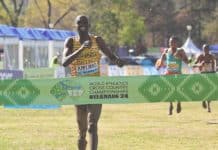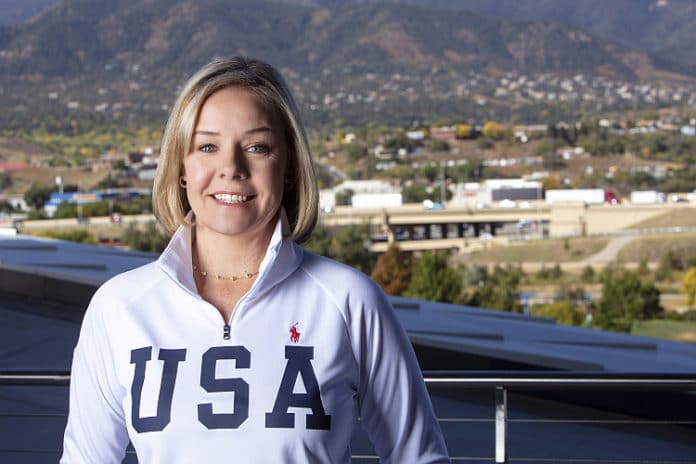● Plus: USOPC: Swim icon Phelps leads USOPC Hall of Fame nominees = Modern Pentathlon: UIPM to trial two forms of obstacles; athlete group asks for IOC intervention = Swimming: U.S. Worlds trials produce world top-3 of 26 of 28 Olympic events; six swimmers qualified in 3+ events = SCOREBOARD => Athletics: Rooth & Kalin win in Grosseto; King 9.90w, Lyles 19.86, Terry 10.94 in Florida = Wrestling: U.S. Open Greco finals see seven repeat winners! ●
In 2018, the United States Olympic Committee selected Sarah Hirshland as its new Chief Executive, against the background of the Nassar abuse scandal. Four years later, Nassar is in jail, the Los Angeles 2028 Games is coming up fast and the United States Olympic and Paralympic Committee is being remade, following the Tokyo Olympic and Beijing Winter Games.
In a one-on-one interview from Washington, D.C., where the 2021 and 2022 teams will be honored at the White House on Wednesday, Hirshland went into detail about how the world’s leading National Olympic Committee is being rewired. Longtime Chief of Sport Performance Rick Adams is being let go and new divisions are being formed. Her overview:
“We’ve reorganized the organization into five divisions if you will, and the new position that we’re recruiting for now is a Chief of Sport and Athlete Services role, which will be a very significant leadership role for the organization, tackling not only Olympic and Paralympic sport performance, but also looking at the areas of focus where we’re looking at pipeline, and the health and efficacy of [National Governing Bodies], so our NGB services and support, our collegiate partnerships work and then also the holistic, sort of health and wellness and services to athletes.
“So it’s a very broad role, with several functions. It isn’t a new Head of Sport Performance. It’s a broad-based leadership role that will oversee a number of the areas for us as an organization.
“That’s one division. And then we’ve got a Strategy and Growth team that are really focused on, sort of, organizational innovation and driving strategy and innovation for the organization as well as critical pieces of the partnership with what now is LA28, and we hope at some point will be a Salt Lake organizing committee as well. And then looking at marketing and communications, international relations, government relations, really managing those important audiences and our service to those groups really effectively.
“And then we’ll have a Development Division that’s really the [U.S. Olympic & Paralympic Foundation], and our fund-raising and philanthropic [arm]. As you know, that’s our most important opportunity for variable revenue. That’s our opportunity to really grow our revenue stream over the next several years, and so the Foundation is critically important, has a really good, strong foundation now that can start to expand its purview, if you will, as we think about the classic fund-raising pyramid. Ultimately, when you have really great infrastructure and sophistication as a foundation, you can start to ask for bigger and bigger gifts, and start to build the bottom of the pyramid, which is more volume gifts. They tend to be smaller in size, but more numerous in number. And those will both be key area of focus for us as we look at the Foundation over the next several years.
“And then we’ll have what is essentially an Operating division, running important organizational services: legal, I.T., finance, ethics and compliance, making sure that we as an organization are operating and optimizing our effectiveness in the way we conduct our business.
“And then the last is the People function. And thinking about the people function a little but differently as we go forward in an expanded capacity to consider not only ‘USOPC staff,’ but also thinking about talent development for the [U.S. Olympic] Movement, thinking about how can we develop talent and find talent to feed not only our organization on an ongoing basis, but National Governing Bodies and other important entities in the Movement, and ideally building that kind of talent development and pipeline so that we can provide opportunities for athletes, as they may retire from athletics and want to go into sport administration. We want to be really thoughtful about what that might look like over time.”
While all these changes are being made, the USOPC and LA28 are marketing sponsorship and licensing agreements, with a $2.518 billion sales goal listed on the LA28 budget. The USOPC and the Los Angeles 2028 organizers created a new entity, U.S. Olympic & Paralympic Properties (USOPP) to do the work. So far?
“We’re really excited and feel very confident that LA28, and really USOPP in particular, has done a very nice job of – in some cases – renewing or working toward, renewals of partners who have been partners of the then-USOC and [now] USOPC … in addition to bringing in some new partners.”
The USOPC will receive a minimum of $476 million from the USOPP partnership from 2021-2028 and Hirshland noted that the project is on track.
The USOPC leadership is also about to change, as Board Chair Susanne Lyons will conclude her term – and her Board service – at the end of this year; she has served since 2010 and was the organization’s interim chief executive after Scott Blackmun retired, and until Hirshland took over.
The United States currently has two International Olympic Committee members, Anita DeFrantz (elected in 1986) and David Haggerty, the President of the International Tennis Federation (elected in 2020). Winter Olympic gold medalist Kikkan Randall, who was an elected Athletes Commission member, resigned in 2021 due to health issues.
So will the U.S. get another IOC member anytime soon?
“We knew that the transition from Larry [Probst] to Susanne [Lyons] for a short duration was likely to make having our President/Board Chair named to the IOC and that was a decision that the organization made. You know, Susanne’s term comes to an end this year; we’ll have a new Board chair. Certainly the hope is that that new Board Chair would be considered for an IOC seat.”
The chatter about the next USOPC Board Chair has already started in earnest, with former U.S. Ski & Snowboard Chair Dexter Paine and former EY Global Vice Chair for Public Policy Beth Brooke – both on the Board now – being mentioned often.
Coming tomorrow: Hirshland explains the USOPC’s challenge of expanding its audience and navigating the increasingly shaky collegiate sports system.
≡ THE 5-RING CIRCUS ≡
● U.S. Olympic & Paralympic Committee ● Nominations are out for the Class of 2022 for the U.S. Olympic & Paralympic Hall of Fame, with voting continuing through 16 May and induction ceremonies on 24 June in Colorado Springs, Colorado.
The finalists include 15 Olympians, nine Paralympians, three Olympic teams, two Paralympic teams, six legends, three coaches and three special contributors, to be narrowed down to five Olympians, three Paralympians, one Olympic team and one Paralympic team and one legend, coach and contributor. The nominees:
● Olympic (vote for 5):
Kristin Armstrong, Cycling
Natalie Coughlin, Swimming
Shani Davis, Speedskating
Cammi Granato, Hockey
Mia Hamm, Soccer
Kayla Harrison, Judo
Michelle Kwan, Figure Skating
Eleanor ‘Elle’ Logan, Rowing
Julia Mancuso, Alpine Skiing
Bode Miller, Alpine Skiing
Michael Phelps, Swimming
John Smith, Wrestling
Dawn Staley, Basketball
Brenda Villa, Water Polo
Lindsey Vonn, Alpine Skiing
● Paralympic (vote for 3):
Steve Cash, Sled Hockey
Muffy Davis, Para Alpine Skiing & Para-cycling
Susan Hagel, Wheelchair Basketball, Para Archery & Track and Field
Trischa Zorn-Hudson, Para Swimming
David Kiley, Wheelchair Basketball, Para Track and Field & Alpine Skiing
Marla Runyan, Para Track and Field and Olympic Track and Field
Marlon Shirley, Para Track and Field
Andy Soule, Para Nordic Skiing
Cortney (Jordan) Truitt, Para Swimming
● Olympic Team (vote for 1):
1976 Women’s Swimming 4×100 Freestyle Relay Team
1996 U.S. Olympic Women’s Basketball Team
2010 Four-Man Bobsled Team
● Paralympic Team (vote for 1):
2002 U.S. Sled Hockey Team
2008 U.S. Paralympic Sailing Team
● Legend:
Billy Fiske, Bobsled
Gretchen Fraser, Alpine Skiing
Roger Kingdom, Track and Field
Darrell Pace, Archery
Brad Parks, Wheelchair Tennis
Norbert ‘Norb’ Schemansky, Weightlifting
● Coach:
Bob Beattie, Alpine Skiing
James ‘Doc’ Counsilman, Swimming
Pat Summit, Basketball
● Special Contributor:
Walter Bush
Billie Jean King
David Wallechinsky
OK, Phelps is pretty much a shoo-in, but choosing among the others? The voting site has some short biographical notes on each candidate, which is a help (and more here), but what a class this will be.
● Modern Pentathlon ● As widely expected, the UIPM Executive Board recommended the testing of two different forms of obstacle-course racing to replace riding as the fifth discipline in the sport, for possible inclusion in the 2028 Olympic Games:
“Testing will begin immediately after the UIPM 2022 Pentathlon World Cup Final in Ankara (TUR) in late June. Following comprehensive testing, the final decision will be taken by the UIPM Congress.”
No specifics were given.
The Pentathlon United athlete group, which has railed against both the UIPM leadership and the replacement of riding, was furious:
“We repeat our call for the IOC to intervene & make clear to @WorldPentathlon [Executive Board] that they must listen to the views of the athletes who have spoken so clearly in our survey & ensure they are at the centre of this process as the IOC stated in December.”
The group posted a 1 May letter to the IOC, including:
“Our recent survey, which concluded in April 2022, saw 310 athletes respond – 168 (54%) of whom are current athletes competing in Olympic/international events, 5% currently compete in Masters events and 29% are former athletes (12% undeclared).
“The key results of the survey are:
“● Over 85% disagree with the statement that UIPM considers athlete opinion in how it runs the sport
“● Over 95% are unhappy with the way that the UIPM conducted the change in the 5th discipline
“● Over 93% are unhappy with the direction the sport is currently going in
“● Over 90% believe the UIPM is not capable of building a strong future for the sport
“● Over 77% say it’s unlikely they will stay in the sport if the equestrian discipline is removed”
The conclusion asked that the IOC conduct “a comprehensive, independent investigation into the standards of governance and probity of the UIPM and the 5th Discipline consultation process as a matter of urgency.”
● Swimming ● USA Swimming’s Phillips 66 International Team Trials are over and the World Championships team for Budapest has been selected. But it’s worth noting what an amazing meet this was. Consider:
World Record:
● Men/50 m Back: 23.71, Hunter Armstrong (old, 23.80, Kliment Kolesnikov [RUS], 2021)
American Records:
● Men/50 m Back: 24.01, Hunter Armstrong (in heats; old, 24.24, Ryan Murphy, 2018)
● Men/50 m Back: 23.71, Hunter Armstrong (in final)
● Men/50 m Breast: 26.52, Michael Andrew (old, 26.76, Kevin Cordes, 2015)
● Women/50 m Back: 27.12, Katharine Berkoff (old, 27.33, Olivia Smoliga, 2019)
World leads:
● Men/50 m Free: 21.29, Caeleb Dressel (day 5)
● Men/100 m Free: 47.79, Caeleb Dressel (day 1)
● Men/200 m Free: 1:45.25, Keiran Smith (day 2)
● Men/50 m Back: 24.01, Hunter Armstrong (day 3 heats)
● Men/50 m Back: 23.71 Hunter Armstrong (day 3)
● Men/100 m Back: 52.20, Hunter Armstrong (day 4)
● Men/200 m Back: 1:55.57, Shaine Casas (day 2 heats)
● Men/200 m Back: 1:55.01, Ryan Murphy (day 2)
● Men/100 m Breast: 58.37, Nic Fink (day 4)
● Men/50 m Fly: 22.84, Caeleb Dressel (day 2)
● Men/100 m Fly: 50.01, Caeleb Dressel (day 3 heats)
● Women/400 m Free: 3:59.52, Katie Ledecky (day 4)
● Women/800 m Free: 8:09.27, Katie Ledecky (day 1)
● Women/1,500 m Free: 15:38.99, Katie Ledecky (day 5)
● Women/50 m Back: 27.12, Katharine Berkoff (day 3)
● Women/100 m Back: 58.29, Regan Smith (day 4 heats)
● Women/100 m Back: 57.76, Regan Smith (day 4)
● Women/200 m Breast: 2:21.19, Lilly King (day 2)
● Women/100 m Fly: 56.28, Torri Huske (day 3)
● Women/200 m Medley: 2:07.84, Alex Walsh (day 5)
Consider that in the 14 men’s individual Olympic events, the U.S. men are in the top three in 12 and in the women’s Olympic events, 14 of 14.
USA Swimming named 41 swimmers to the Budapest World Championships team, with six entered in three or more individual events:
4: Michael Andrew: men’s 50 m Free, 50-100 m Breast, 100 m Fly
4: Caeleb Dressel: men’s 50-100 m Free, 50-100 m Fly
4: Katie Ledecky: women’s 200-400-800-1,500 m Free
4: Claire Curzan: women’s 100 m Free, 100 Back, 50-100 m Fly
3: Torri Huske: women’s 50-100 m Free; 100 m Fly
3: Lilly King: women’s 50-100-200 m Breast
Don’t forget there are oodles of relays at the Worlds; it is possible that sprinters like Dressel, Curzan or Huske could swim in as many as seven or eight events in Budapest. Dressel won eight medals (6-2-0) at the 2017 Worlds in Gwangju (KOR) and seven (7-0-0) at the 2019 Worlds held … in Budapest!
(Thanks to statistician extraordinaire Bill Mallon for noting that Curzan is in four events, not three.)
≡ SCOREBOARD ≡
More results from a busy weekend:
● Athletics ● Norway’s Markus Rooth and Swiss Annik Kalin led the parade at the annual Multistars showcase in Grosseto (ITA).
The 20-year-old Rooth got a national record of 8,307 to win and move to no. 4 on the world list for 2022, just ahead of countryman Sander Aae Skotheim (8,298) and Italy’s Dario Dester (ITA: 8,109).
Kalin, 22, also set a national record for the heptathlon, scoring 6,398 for no. 2 in the world for 2022, well ahead of Sveva Gerevini (ITA: 6,011) and Claudia Conte of Spain (5,914) in third.
¶
Fast sprinting at the Pure Athletics Global Invitational in Clermont, Florida on Sunday, with mostly wind-aided times, but another impressive run for former USC star Twanisha Terry.
She won the women’s 100 m final in a season-best 10.94, with a 1.3 m/s breeze at her back, beating Jamaica’s Briana Williams (11.03). Olympic 400 m champ Shaunae Miler-Uibo flew to a 10.92 win in the heats, but with a major aiding wind of 5.5 m/s. Williams won heat three in 10.96w (+5.3) and Terry won heat four in 10.96w (+5.0).
The men’s 100 m saw Kyree King get the win with a season-best 9.98 (+1.3) over Jerome Blake (CAN: 10.00) and Aaron Brown (CAN: 10.09). The wind-aided heats saw King and Noah Lyles run 1-2 in heat five in 9.90 for both, but with a 3.9 m/s aiding wind.
Lyles skipped the 100 m final to win the 200 m instead, with a season’s best of 19.86 and legal wind of +0.8 m/s, moving him to no. 4 on the 2022 world list. Younger brother Josephus Lyles was second in the same race at 20.20.
● Wrestling ● Sunday evening’s Greco-Roman finals at the U.S. Open in Las Vegas was mostly about familiar faces, as seven of the 10 winners were prior champions!
Two-time Olympian Ben Provisor (82 kg) won his fifth U.S. Open championship, but had to defeat 2021 winner Spencer Woods, 5-3. Max Nowry (55 kg) won his fourth U.S. Open crown and there were two third-time winners: Ildar Hafizov (60 kg) and Cohlton Schultz (130 kg).
Winning their second titles were Alejandro Sancho (67 kg), Benji Peak (72 kg) and Alan Vera (87 kg).
The Army World Class Athlete Program (WCAP) produced six of the winners, including Nowry, Hafizov (named Outstanding Wrestler) and Sancho, plus Jesse Thielke at 63 kg, Britton Holmes at 77 kg and Lucas Sheridan at 97 kg.
You can receive our exclusive TSX Report by e-mail by clicking here. You can also refer a friend by clicking here, and can donate here to keep this site going.
For our updated, 620-event International Sports Calendar for 2022 and beyond, by date and by sport, click here!




















